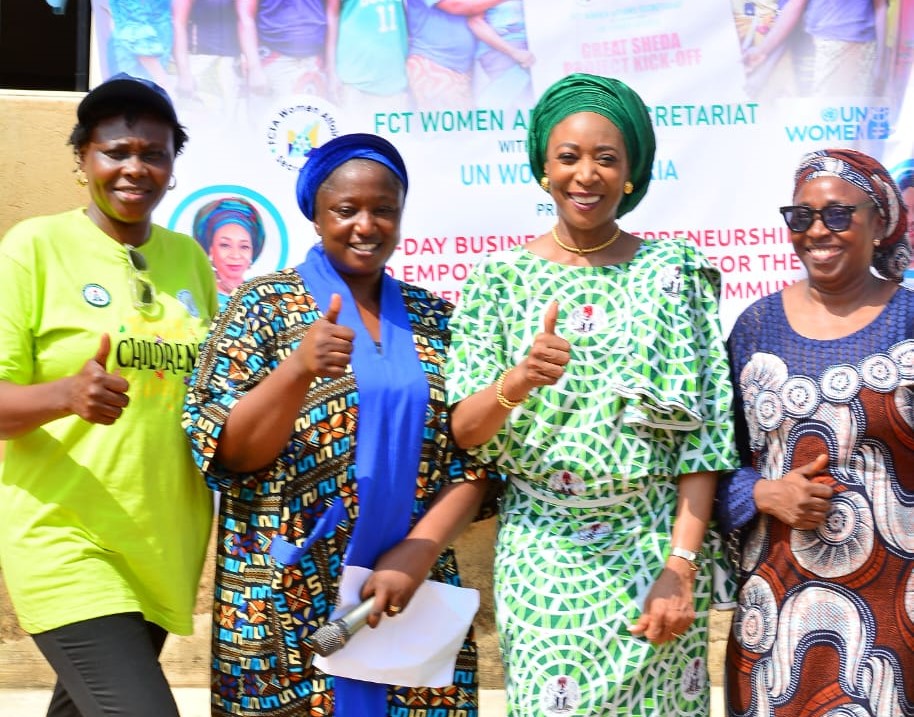FCTA, UN Women train rural women on cassava processing, branding
By Philip Yatai
The Women Affairs Secretariat, Federal Capital Territory Administration (FCTA) and the UN Women have begun the empowerment of more than 150 women on cassava processing and branding for the international market.
Mandate Secretary of the secretariat, Dr Adedayo Benjamins-Laniyi, disclosed this in an interview with the News Agency of Nigeria (NAN) in Abuja on Monday.
Benjamins-Laniyi explained that the empowerment was under the FCT’s “Ba Yunwa: Ba Fushi” economic empowerment project with support from UN Women.
Ba yunwa: Ba fushi is a hausa expression which means “no hunger: no anger”.
She said that the beneficiaries were drawn from Sheda community in Kwali Area Council of the territory, to improve agricultural businesses in rural communities.
She said that the empowerment programme, which began on July 9, was to harness Sheda women’s entrepreneurial skills in processing and branding of “akpu”, a local delicacy for the international market.
Akpu, also known as fufu, is a popular Nigerian food, particularly among the Igbo people and other groups in the South-South region.
It is made from fermented cassava and often enjoyed with various Nigerian soups.
She said that 50 women were already trained as part of FCTA’s commitment to strengthening women’s resilience, improving food security, and enhancing overall well-being of residents.
She explained that the project was designed to empower women, girls, and children in the FCT, particularly the Akpu Women’s Group in Kwali Area Council.
She added that the goal of the project was to strengthen women’s resilience, improve food security, and enhance the overall well-being of residents in the FCT.
“It was also designed to provide access to a reliable source of water for the Akpu Women’s Group through the provision of a borehole for the Akpu Agro-processing Zone.
“This will enable the women to have access to a reliable source of water, which is essential for their agricultural activities.
“It was equally meant to equip the women with the skills and knowledge they need to start and manage their own businesses through business entrepreneurship and empowerment training.
“The overall goal is to improve the economic well-being of the women and their families,” she said.
Benjamins-Laniyi said that the project aligned with the administration’s commitment to gender inclusivity and sustainable development, a key part of the two-year celebration of renewed hope in the FCT.
She reiterated FCT Minister Nyesom Wike’s commitment to empower women across the six area councils of the territory, in line with President Bola Tinubu ‘s “Renewed Hope Agenda”.
According to her, the women were being trained extensively to improve their cassava processing and branding skills.
“This will enable them to tap the potential of the international market.
“We are poised to strengthen women’s capacity in agricultural processing, improve food security and enhance the overall well-being of FCT residents.
“This we are doing through strategic empowerment of Sheda women engaged in processing of “akpu”, with improved skills, improved standards of hygiene, as well as branded packaging for export.”
The mandate secretary added that a work shed and a borehole were being constructed for the women to provide conducive working environment and water to support their processing businesses.
She thanked UN Women for the continued support and partnership to change the lot of women, girls and children in the FCT.
Also, the Head of UN Women Representative to Nigeria and ECOWAS, Mrs Beatrice Enyong, said that the empowerment sought to build women’s capacity towards enhancing food security in Nigeria.
Enyong, who was represented at the event by the acting Deputy Country Representative, Mrs Patience Ekeoba, said that the empowerment would address challenges faced by women in agro-entrepreneurship, income generation and self-sufficiency.
She commended the FCT Women Affairs Secretariat for the bold initiative aimed at creating a community-driven solution for women, families and the local economy.
“This programme seeks to address several challenges in our community, such as lack of access to entrepreneurship training, low participation in economic activities and poor access to clean water and sanitation.
“Other challenges include limited skills for managing small businesses and the persistent burden for women to provide for their families with little structural support,” she said. (NAN)
Edited by Abiemwense Moru





